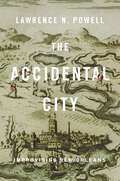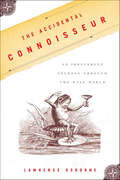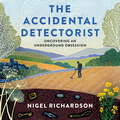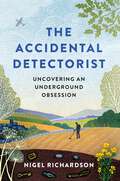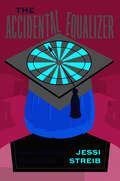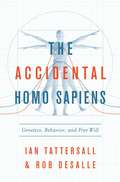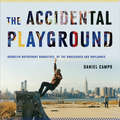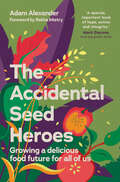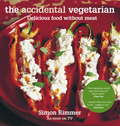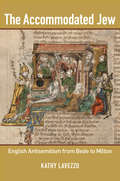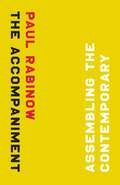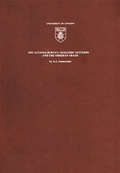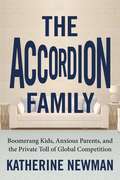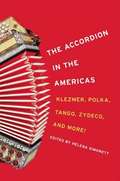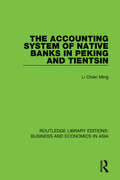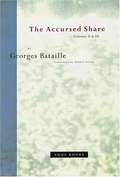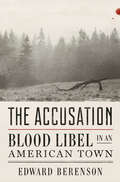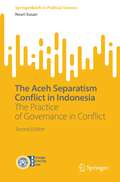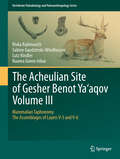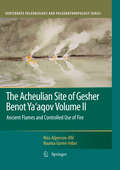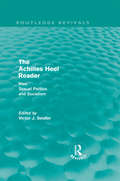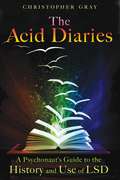- Table View
- List View
The Accidental City: Improvising New Orleans
by Lawrence N. PowellThis is the story of a city that shouldn't exist. In the seventeenth century, what is now America's most beguiling metropolis was nothing more than a swamp: prone to flooding, infested with snakes, battered by hurricanes. But through the intense imperial rivalries of Spain, France, and England, and the ambitious, entrepreneurial merchants and settlers from four continents who risked their lives to succeed in colonial America, this unpromising site became a crossroads for the whole Atlantic world. Lawrence N. Powell, a decades-long resident and observer of New Orleans, gives us the full sweep of the city's history from its founding through Louisiana statehood in 1812. We see the Crescent City evolve from a French village, to an African market town, to a Spanish fortress, and finally to an Anglo-American center of trade and commerce. We hear and feel the mix of peoples, religions, and languages from four continents that make the place electric-and always on the verge of unraveling. The Accidental City is the story of land-jobbing schemes, stock market crashes, and nonstop squabbles over status, power, and position, with enough rogues, smugglers, and self-fashioners to fill a picaresque novel. Powell's tale underscores the fluidity and contingency of the past, revealing a place where people made their own history. This is a city, and a history, marked by challenges and perpetual shifts in shape and direction, like the sinuous river on which it is perched.
The Accidental Connoisseur: An Irreverent Journey Through the Wine World
by Lawrence Osborne“Witty, sometimes withering, learned and often loopy musings on the world of fine wine . . . an excellent drinking companion.” —Adam Sachs, NewsdayWhat is taste? Is it individual or imposed on us from the outside? Why are so many of us so intimidated when presented with the wine list at a restaurant? In The Accidental Connoisseur, journalist Lawrence Osborne takes off on a personal voyage through a little-known world in pursuit of some answers. Weaving together a fantastic cast of eccentrics and obsessives, industry magnates and small farmers, the author explores the way technological change, opinionated critics, consumer trends, wheelers and dealers, trade wars, and mass market tastes have made the elixir we drink today entirely different from the wine drunk by our grandparents.In his search for wine that is a true expression of the place that produced it, Osborne takes the reader from the high-tech present to the primitive past. From a lavish lunch with wine tsar Robert Mondavi to the cellars of Marquis Piero Antinori in Florence, from the tasting rooms of Chateau Lafite to the humble vineyards of northern Lazio, Osborne winds his way through Renaissance palaces, $27 million wineries, tin shacks and garages, opulent restaurants, world-famous chais and vineyards, renowned villages and obscure landscapes, as well as the great cities which are the temples of wine consumption: New York, San Francisco, Paris, Florence, and Rome. On the way, we will be shown the vast tapestry of this much-desired, little-understood drink: who produces it and why, who consumes it, who critiques it? Enchanting, delightful, entertaining, and, above all, down to earth, this is a wine book like no other.
The Accidental Detectorist: Uncovering an Underground Obsession
by Nigel RichardsonWhen a travel writer is stuck on home soil in the middle of a pandemic he meets Kris Rodgers, one of Britain's eminent metal detectorists. Dipping a toe in the hobby, Nigel quickly finds himself swept up in the world beneath the surface. Above the ground are a cast of fascinating and passionate people who open Nigel's eyes to a subterranean world of treasure and stories that bring the history of the island to life.Scouring the country from Cornwall to Scotland in search of treasure and the best detectorists, Nigel finds himself more immersed in the culture than he bargained for and makes his own personal journey from cynicism to obsession in his trail through the heartlands of metal detecting. From women's groups who react against the hobby's male bias, to the 'Nighthawks' who risk jail-time in their pursuits, he finds his preconceptions disabused and gets to the heart of what makes this quiet community so obsessed with happy beeps.(p) 2022 Octopus Publishing Group
The Accidental Detectorist: Uncovering an Underground Obsession
by Nigel Richardson'Richardson writes beautifully about his return to the land, about listening to the soil and about understanding the ancient world.' - The SpectatorEach new field is hope, each old one reality.There are things below the surface that pull people together in a shared love of history, landscape and the hope that, this time, something incredible will be unearthed.When a travel writer is stuck on home soil in the middle of a pandemic he tries his hand at metal detecting - and is instantly addicted. This all-consuming hobby takes him around the country, back through history and deep into the psyches(his own included) of those hooked on 'happy bleeps'.The Accidental Detectorist is a big-hearted dig into a pastime sometimes mocked but always enticing.***When locked-down travel writer Nigel Richardson is looking for a travel story close to his country cottage he turns to a leading metal detectorist with an infectious passion for the hobby. Before he knows it the mysteries of the fields are leading him on, into a world that casts the history of these isles and its people in an intriguing new light.Sifting Britain's soil from Portsmouth to Edinburgh, Nigel yearns to lose his detectorist's virginity by finding a 'hammered' coin - while learning that the search for treasure comes with a serious responsibility to our common heritage. As he immerses himself further in the world of metal detecting, exposing the shady activities of 'nighthawks', attending rallies and making lifelong friends, a change comes over him. This country beneath his feet, these people who scour it for clues and tokens - they are the home he's been looking for.
The Accidental Detectorist: Uncovering an Underground Obsession
by Nigel Richardson'Richardson writes beautifully about his return to the land, about listening to the soil and about understanding the ancient world.' - The SpectatorEach new field is hope, each old one reality.There are things below the surface that pull people together in a shared love of history, landscape and the hope that, this time, something incredible will be unearthed.When a travel writer is stuck on home soil in the middle of a pandemic he tries his hand at metal detecting - and is instantly addicted. This all-consuming hobby takes him around the country, back through history and deep into the psyches(his own included) of those hooked on 'happy bleeps'.The Accidental Detectorist is a big-hearted dig into a pastime sometimes mocked but always enticing.***When locked-down travel writer Nigel Richardson is looking for a travel story close to his country cottage he turns to a leading metal detectorist with an infectious passion for the hobby. Before he knows it the mysteries of the fields are leading him on, into a world that casts the history of these isles and its people in an intriguing new light.Sifting Britain's soil from Portsmouth to Edinburgh, Nigel yearns to lose his detectorist's virginity by finding a 'hammered' coin - while learning that the search for treasure comes with a serious responsibility to our common heritage. As he immerses himself further in the world of metal detecting, exposing the shady activities of 'nighthawks', attending rallies and making lifelong friends, a change comes over him. This country beneath his feet, these people who scour it for clues and tokens - they are the home he's been looking for.
The Accidental Equalizer: How Luck Determines Pay after College
by Jessi StreibA startling discovery—that job market success after college is largely random—forces a reappraisal of education, opportunity, and the American dream. As a gateway to economic opportunity, a college degree is viewed by many as America’s great equalizer. And it’s true: wealthier, more connected, and seemingly better-qualified students earn exactly the same pay as their less privileged peers. Yet, the reasons why may have little to do with bootstraps or self-improvement—it might just be dumb luck. That’s what sociologist Jessi Streib proposes in The Accidental Equalizer, a conclusion she reaches after interviewing dozens of hiring agents and job-seeking graduates. Streib finds that luck shapes the hiring process from start to finish in a way that limits class privilege in the job market. Employers hide information about how to get ahead and force students to guess which jobs pay the most and how best to obtain them. Without clear routes to success, graduates from all class backgrounds face the same odds at high pay. The Accidental Equalizer is a frank appraisal of how this “luckocracy” works and its implications for the future of higher education and the middle class. Although this system is far from eliminating American inequality, Streib shows that it may just be the best opportunity structure we have—for better and for worse.
The Accidental Homo Sapiens: Genetics, Behavior, And Free Will
by Ian Tattersall Robert DeSalleWhat happens now that human population has outpaced biological natural selection? Two leading scientists reveal how we became who we are—and what we might become. When you think of evolution, the picture that most likely comes to mind is a straight-forward progression, the iconic illustration of a primate morphing into a proud, upright human being. But in reality, random events have played huge roles in determining the evolutionary histories of everything from lions to lobsters to humans. However, random genetic novelties are most likely to become fixed in small populations. It is mathematically unlikely that this will happen in large ones. With our enormous, close-packed, and seemingly inexorably expanding population, humanity has fallen under the influence of the famous (or infamous) “bell curve.” Ian Tattersall and Rob DeSalle’s revelatory new book explores what the future of our species could hold, while simultaneously revealing what we didn’t become—and what we won’t become. A cognitively unique species, and our actions fall on a bell curve as well. Individual people may be saintly or evil; generous or grasping; narrow-minded or visionary. But any attempt to characterize our species must embrace all of its members and so all of these antitheses. It is possible not just for the species, but for a single individual to be all of these things—even in the same day. We all fall somewhere within the giant hyperspace of the human condition that these curves describe. The Accidental Homo Sapiens shows readers that though humanity now exists on this bell curve, we are far from a stagnant species. Tattersall and DeSalle reveal how biological evolution in modern humans has given way to a cultural dynamic that is unlike anything else the Earth has ever witnessed, and that will keep life interesting—perhaps sometimes too interesting—for as long as we exist on this planet.
The Accidental Playground: Brooklyn Waterfront Narratives of the Undesigned and Unplanned
by Daniel CampoThe Accidental Playground explores the remarkable landscape created by individuals and small groups who occupied and rebuilt an abandoned Brooklyn waterfront. While local residents, activists, garbage haulers, real estate developers, speculators, and two city administrations fought over the fate of the former Brooklyn Eastern District Terminal (BEDT), others simply took to this decaying edge, transforming it into a unique venue for leisure, creative, and everyday practices. These occupiers and do-it-yourself builders created their own waterfront parks and civic spaces absent every resource needed for successful urban development, including plans, designs, capital, professional assistance, consensus, and permission from the waterfront’s owners. Amid trash, ruins, weeds, homeless encampments, and the operation of an active garbage transfer station, they inadvertently created the “Brooklyn Riviera” and made this waterfront a destination that offered much more than its panoramic vistas of the Manhattan skyline. The terminal evolved into the home turf for unusual and sometimes spectacular recreational, social, and creative subcultures, including the skateboarders who built a short-lived but nationally renowned skatepark, a twenty-five-piece “public” marching band, fire performance troupes, artists, photographers, and filmmakers. At the same time it served the basic recreational needs of local residents. Collapsing piers became great places to catch fish, sunbathe, or take in the views; the foundation of a demolished warehouse became an ideal place to picnic, practice music, or do an art project; rubble-strewn earth became a compelling setting for film and fashion shoots; a broken bulkhead became a beach; and thick patches of weeds dotted by ailanthus trees became a jungle. These reclamations, all but ignored by city and state governments and property interests that were set to transform this waterfront, momentarily added to the distinctive cultural landscape of the city’s most bohemian and rapidly changing neighborhood.Drawing on a rich mix of documentary strategies, including observation, ethnography, photography, and first-person narrative, Daniel Campo probes this accidental playground, allowing those who created it to share and examine their own narratives, perspectives, and conflicts. The multiple constituencies of this waterfront were surprisingly diverse, their stories colorful and provocative. When taken together, Campo argues, they suggest a radical reimagining of urban parks and public spaces, and the practices by which they are created and maintained. The Accidental Playground, which treats readers to an utterly compelling story, is an exciting and distinctive contribution to the growing literature on unplanned spaces and practices in cities today.
The Accidental Seed Heroes: Growing a Delicious Food Future for All of Us
by Adam Alexander"A special, important book of hope, action and integrity."—Mark Diacono, food and garden writer"After reading Adam&’s book, I won&’t look at a handful of seed the same way again!"—Joe Swift, garden designer; writer; presenter, BBC&’s Gardeners&’ WorldAcross the world, chefs, farmers, plant scientists and backyard growers are doing something extraordinary: creating new generations of fruit, vegetables and cereals, all bred specifically to flourish locally, taste delicious, and contribute to our food future.In The Accidental Seed Heroes, Adam Alexander dons his seed detective homburg to meet these twenty-first century seed heroes, who are not only championing traditional varieties but also breeding delicious new ones that will help create a sustainable future for our planet.We don&’t all need to become backyard breeders or even, like Adam, accidental ones. We don&’t even need to eschew, as growers, the modern hybrid cultivars our seed catalogues are stuffed with or, as consumers, boycott those same uninspiring specimens that populate our supermarket shelves. Adam just wants that choice to be better informed and infinitely more diverse and enjoyable.This story is a celebration of the locally and sustainably grown produce, whether traditional or innovative, that is at the heart of all our food cultures and empowers our rural communities and farmers. Adam believes these new varieties of fruits, vegetables and even grains will not just offer us all nutritious and delicious food but also be part of the solution to combating climate change and returning fertility to our soils and biodiversity to our land.
The Accidental Vegetarian: Delicious And Eclectic Food Without Meat
by Simon RimmerWhen Simon Rimmer bought a small vegetarian restaurant, he had no idea how to cook. Armed with two cookbooks and heaps of enthusiasm, he and a friend created the best vegetarian restaurant in Manchester, famous for its unusual food and lovely atmosphere. A confirmed meat eater, Simon had to rethink his cooking and has created vegetarian recipes to please even the most dedicated carnivore. This book is a collection of some of his recipes that are quick to prepare but totally delicious. From good old favourites like macaroni cheese to Simon's more exotic fusion creations such as spicy beetroot and coconut soup, The Accidental Vegetarian will kill the lentil and sandal image of vegetarianism forever!
The Accidental Vegetarian: Delicious food without meat
by Simon RimmerDeliciously simple, meat-free recipes from 'Something For The Weekend' presenter and Strictly Come Dancing contestant Simon Rimmer.
The Accommodated Jew: English Antisemitism from Bede to Milton
by Kathy LavezzoEngland during the Middle Ages was at the forefront of European antisemitism. It was in medieval Norwich that the notorious "blood libel" was first introduced when a resident accused the city's Jewish leaders of abducting and ritually murdering a local boy. England also enforced legislation demanding that Jews wear a badge of infamy, and in 1290, it became the first European nation to expel forcibly all of its Jewish residents. In The Accommodated Jew, Kathy Lavezzo rethinks the complex and contradictory relation between England’s rejection of “the Jew” and the centrality of Jews to classic English literature. Drawing on literary, historical, and cartographic texts, she charts an entangled Jewish imaginative presence in English culture. In a sweeping view that extends from the Anglo-Saxon period to the late seventeenth century, Lavezzo tracks how English writers from Bede to Milton imagine Jews via buildings—tombs, latrines and especially houses—that support fantasies of exile. Epitomizing this trope is the blood libel and its implication that Jews cannot be accommodated in England because of the anti-Christian violence they allegedly perform in their homes. In the Croxton Play of the Sacrament, Marlowe’s The Jew of Malta, and Shakespeare’s The Merchant of Venice, the Jewish house not only serves as a lethal trap but also as the site of an emerging bourgeoisie incompatible with Christian pieties. Lavezzo reveals the central place of “the Jew” in the slow process by which a Christian “nation of shopkeepers” negotiated their relationship to the urban capitalist sensibility they came to embrace and embody. In the book’s epilogue, she advances her inquiry into Victorian England and the relationship between Charles Dickens (whose Fagin is the second most infamous Jew in English literature after Shylock) and the Jewish couple that purchased his London home, Tavistock House, showing how far relations between gentiles and Jews in England had (and had not) evolved.
The Accompaniment: Assembling the Contemporary
by Paul RabinowIn this culmination of his search for anthropological concepts and practices appropriate to the twenty-first century, Paul Rabinow contends that to make sense of the contemporary anthropologists must invent new forms of inquiry. He begins with an extended rumination on what he gained from two of his formative mentors: Michel Foucault and Clifford Geertz. Reflecting on their lives as teachers and thinkers, as well as human beings, he poses questions about their critical limitations, unfulfilled hopes, and the lessons he learned from and with them. This spirit of collaboration animates The Accompaniment, as Rabinow assesses the last ten years of his career, largely spent engaging in a series of intensive experiments in collaborative research and often focused on cutting-edge work in synthetic biology. He candidly details the successes and failures of shifting his teaching practice away from individual projects, placing greater emphasis on participation over observation in research, and designing and using websites as a venue for collaboration. Analyzing these endeavors alongside his efforts to apply an anthropological lens to the natural sciences, Rabinow lays the foundation for an ethically grounded anthropology ready and able to face the challenges of our contemporary world.
The Accompaniment: Assembling the Contemporary
by Paul RabinowIn this culmination of his search for anthropological concepts and practices appropriate to the twenty-first century, Paul Rabinow contends that to make sense of the contemporary anthropologists must invent new forms of inquiry. He begins with an extended rumination on what he gained from two of his formative mentors: Michel Foucault and Clifford Geertz. Reflecting on their lives as teachers and thinkers, as well as human beings, he poses questions about their critical limitations, unfulfilled hopes, and the lessons he learned from and with them. This spirit of collaboration animates The Accompaniment, as Rabinow assesses the last ten years of his career, largely spent engaging in a series of intensive experiments in collaborative research and often focused on cutting-edge work in synthetic biology. He candidly details the successes and failures of shifting his teaching practice away from individual projects, placing greater emphasis on participation over observation in research, and designing and using websites as a venue for collaboration. Analyzing these endeavors alongside his efforts to apply an anthropological lens to the natural sciences, Rabinow lays the foundation for an ethically grounded anthropology ready and able to face the challenges of our contemporary world.
The Acconia Survey: Neolithic Settlement and the Obsidian Trade
by A. J. AmmermanReport of a key survey of archaeological sites in the southern toe of Italy to discover Neolithic sites and documenting prehistoric trade in obsidian.
The Accordion Family: Boomerang Kids, Anxious Parents,and the Private Toll of Global Competition
by Katherine S. NewmanWhy are adults in their twenties and thirties boomeranging back to or never leaving their parents' homes in the world's wealthiest countries? Acclaimed sociologist Katherine Newman addresses this phenomenon in this timely and original book that uncovers fascinating links between globalization and the failure-to-launch trend. With over 300 interviews conducted in six countries, Newman concludes that nations with weak welfare states have the highest frequency of accordion families. She thoughtfully considers the positive and negative implications of these new relationships and suggests that as globalization reshapes the economic landscape it also continues to redefine our private lives.
The Accordion in the Americas: Klezmer, Polka, Tango, Zydeco, and More! (Music in American Life)
by Helena SimonettAn invention of the Industrial Revolution, the accordion provided the less affluent with an inexpensive, loud, portable, and durable "one-man-orchestra" capable of producing melody, harmony, and bass all at once. Imported from Europe into the Americas, the accordion with its distinctive sound became a part of the aural landscape for millions of people but proved to be divisive: while the accordion formed an integral part of working-class musical expression, bourgeois commentators often derided it as vulgar and tasteless. This rich collection considers the accordion and its myriad forms, from the concertina, button accordion, and piano accordion familiar in European and North American music to the exotic-sounding South American bandoneón and the sanfoninha. Capturing the instrument's spread and adaptation to many different cultures in North and South America, contributors illuminate how the accordion factored into power struggles over aesthetic values between elites and working-class people who often were members of immigrant and/or marginalized ethnic communities. Specific histories and cultural contexts discussed include the accordion in Brazil, Argentine tango, accordion traditions in Colombia, cross-border accordion culture between Mexico and Texas, Cajun and Creole identity, working-class culture near Lake Superior, the virtuoso Italian-American and Klezmer accordions, Native American dance music, and American avant-garde. Contributors are María Susana Azzi, Egberto Bermúdez, Mark DeWitt, Joshua Horowitz, Sydney Hutchinson, Marion Jacobson, James P. Leary, Megwen Loveless, Richard March, Cathy Ragland, Helena Simonett, Jared Snyder, Janet L. Sturman, and Christine F. Zinni.
The Accounting System of Native Banks in Peking and Tientsin (Routledge Library Editions: Business and Economics in Asia #1)
by Li Chien MingThis book, first published in 1941, is a comprehensive study on the native banks that linked small Chinese traders and the larger Chinese and foreign banks. It is based on extensive research in Tientsin and Peking, and a large number of interviews with native bankers, and the result is an exhaustive study on the practice.
The Accursed Share: An Essay on General Economy (Volumes 2 and #3)
by Robert Hurley Georges BatailleThe three volumes of The Accursed Share address what Georges Bataille sees as the paradox of utility: namely, if being useful means serving a further end, then the ultimate end of utility can only be uselessness. The first volume of The Accursed Share, the only one published before Bataille's death, treated this paradox in economic terms, showing that "it is not necessity but its contrary, luxury, that presents living matter and mankind with their fundamental problems." In the second and third volumes, The History of Eroticism and Sovereignty, Bataille explores the same paradox of utility from an anthropological and an ethical perspective, respectively. The History of Eroticism analyzes the fears and fascination, the prohibitions and transgressions attached to the realm of eroticism as so many expressions of the "uselessness" of erotic life. In the third volume, Batille raises the ethical problems of sovereignty, of "the independence of man relative to useful ends."
The Accusation: Blood Libel In An American Town
by Edward BerensonA chilling investigation of America’s only alleged case of blood libel, and what it reveals about antisemitism in the United States and Europe. On Saturday, September 22, 1928, Barbara Griffiths, age four, strayed into the woods surrounding the upstate village of Massena, New York. Hundreds of people looked everywhere for the child but could not find her. At one point, someone suggested that Barbara had been kidnapped and killed by Jews, and as the search continued, policemen and townspeople alike gave credence to the quickly spreading rumors. The allegation of ritual murder, known to Jews as “blood libel,” took hold. To believe in the accusation seems bizarre at first glance—blood libel was essentially unknown in the United States. But a great many of Massena’s inhabitants, both Christians and Jews, had emigrated recently from Central and Eastern Europe, where it was all too common. Historian Edward Berenson, himself a native of Massena, sheds light on the cross-cultural forces that ignited America’s only known instance of blood libel, and traces its roots in Old World prejudice, homegrown antisemitism, and the resurgence of the Ku Klux Klan in the 1920s. Residues of all three have persisted until the present day. More than just the disturbing story of one town’s embrace of an insidious anti-Jewish myth, The Accusation is a shocking and perceptive exploration of American and European responses to antisemitism.
The Aceh Separatism Conflict in Indonesia: The Practice of Governance in Conflict (SpringerBriefs in Political Science)
by Novri SusanThis book is the first to analyse the practice of governance to resolve conflict in the case of Aceh in Indonesia. Combining theoretical discourse on conflict, democracy, and governance, it draws from original field research on the separatist conflict, utilizing a social constructivist approach in collating observations and interviews with political elites from both the Government of Indonesia and the Aceh Independent Movement (GAM). The conflict was an intractable one in which thousand civilians were killed between 1976 and 2006. The author zooms into the 2003 and 2007 period, against the broader context of the political landscape of Indonesia under the Suharto regime. In doing so, the book tackles the challenges presented by intrastate conflicts relating to ethno-religiosity, land use, and separatism. It unpacks the Indonesian political system’s shift from an authoritarian regime to a democratic one, and demarcates the prevalence of state violence in managing conflicts, as exemplified in the Aceh separatism conflict. Relevent to political scientists and scholars in peace, conflict and development studies, this co-published book presents novel sociological insights into Indonesia’s historical, and contemporary, political landscape.
The Acheulian Site of Gesher Benot Ya‘aqov Volume III
by Naama Goren-Inbar Lutz Kindler Rivka Rabinovich Sabine Gaudzinski-WindheuserMultidisciplinary research on the Early-Middle Pleistocene site of Gesher Benot Ya'aqov has yielded abundant climatic, environmental, ecological and behavioral records. The 15 archaeological horizons form a sequence of Acheulian occupational episodes on the shore of the paleo-Lake Hula. These enable us to reconstruct numerous aspects of the survival and adaptation of ancient hominins, leading to a better understanding of their evolution and behavior. This book presents the faunal analyses of medium-sized and large mammals, providing taxonomic, taphonomic and actualistic data for the largest faunal assemblages. The study of modes of animal exploitation reveals valuable information on hominin behavior.
The Acheulian Site of Gesher Benot Ya’aqov Volume II
by Naama Goren-Inbar Nira Alperson-AfilThe manipulation of fire by early hominins was a turning point in our evolutionary history. Once "domesticated", fire provided warmth, light and protection from predators, as well as enabling the exploitation of a new range of foods. This book presents the spatial analyses of burned and unburned flint items which provide evidence for the controlled use of fire at the 790,000-year-old Acheulian site of Gesher Benot Ya'aqov (GBY). Clusters of burned flint, interpreted as the remnants of hearths, occur throughout the entire occupational sequence of the site. The fact that fire is repetitively used suggests that the knowledge of fire-making and the technological skills of the Acheulian hominins of Gesher Benot Ya'aqov enabled them to set fire at will in diverse environmental settings. "Control of fire marks a significant landmark in human evolution, providing warmth, protection, and many new foods. This important volume compellingly shows that fire was already in regular use some 800,000 years ago." John D. Speth, Museum of Anthropology, University of Michigan, Ann Arbor, USA "A major contribution to knowledge of early human fire history, the finds at Gesher Benot Ya'aqov add immensely to the picture of our early ancestors by the fireside. The authors present a painstaking and multidimensional scientific investigation which should convince even sceptics of the importance of fire use in prehistory" John A.J. Gowlett, British Academy Centenary Research Project, The Archaeology of the Social Brain, UK.
The Achilles Heel Reader: Men, Sexual Politics and Socialism (Routledge Revivals)
by Victor J. SeidlerFirst published in 1991, The Achilles Heel Reader brings together key articles from Achilles Heel, the path-breaking and influential magazine of men's sexual politics. It also includes an important introduction by the editor, setting the magazine in its intellectual and historical context. Achilles Heel, first published in 1978, was a magazine which explored positive conceptions of masculinity and the ways in which men can change in response to the challenge of feminism. It sought to persuade men to take responsibility for the power they share as men in relation to women - and to use this responsibility both in their personal relationships and in challenging the political and social institutions and practices that embody such power. This selection covers crucial issues in men's lives - work, sexuality, children, relationships, family, class, sharing the experience of different masculinities - and brilliantly catches the tensions and anxieties of men trying to cope with the interplay between their sexuality and their political commitments. By bringing the personal and the political together The Achilles Heel Reader reconsiders basic questions of socialist theory and practice. It will be of great value to students of sociology, women's studies, politics and cultural studies, as well as those interested in feminism as part of a process of reworking socialism.
The Acid Diaries: A Psychonaut’s Guide to the History and Use of LSD
by Christopher GrayAn exploration of the personal and spiritual truths revealed through LSD • Reveals that LSD visions weave an ongoing story from trip to trip • Shows that trips progress through three stages: personal issues and pre-birth consciousness, ego-loss, and on to the sacred • Explores psychedelic use throughout history, including the mass hallucinations common in the Middle Ages and the early therapeutic use of LSD Toward the end of his fifties, Christopher Gray took, for the first time in years, a 100-microgram acid trip. So extraordinary, and to his surprise so enjoyable, were the effects that he began to take the same dose in the same way--quietly and on his own--once every two to three weeks. In The Acid Diaries, Gray details his experimentation with LSD over a period of three years and shares the startling realization that his visions were weaving an ongoing story from trip to trip, revealing an underlying reality of personal and spiritual truths. Following the theories of Stanislav Grof and offering quotes from others’ experiences that parallel his own--including those of Aldous Huxley, Albert Hofmann, and Gordon Wasson--he shows that trips progress through three stages: the first dealing with personal issues and pre-birth consciousness; the second with ego-loss, often with supernatural overtones; and the third with sacred, spiritual, and even apocalyptic themes. Pairing his experiences with an exploration of psychedelic use throughout history, including the ergot-spawned mass hallucinations that were common through the Middle Ages and the early use of LSD for therapeutic purposes, Gray offers readers a greater understanding and appreciation for the potential value of LSD not merely for transpersonal growth but also for spiritual development.
